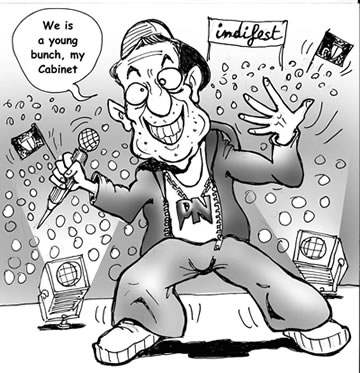On Monday Prime Minister Lawrence Gonzi set the ball rolling for a much-needed national discussion on political party funding. MaltaToday has long been at the forefront of the campaign for more transparency in party financing, and we can therefore only welcome the Prime Minister’s gesture… albeit with a few important reservations.
Dr Gonzi’s declaration came in the wake of the PN secretary general Joe Saliba’s candid admission that his party accepts undisclosed donations from contractors, many of whom go on to win lucrative contracts by government tender. This revelation was itself made after Saliba himself holidayed on board a yacht owned by building contractor Nazzareno Vassallo – a long-standing Nationalist card-holder, who has won several contracts in the past and who is currently involved in the construction of the PN party headquarters in Pietà.
Admittedly the above scenario may not be as shady as it was portrayed in the Labour press. But Saliba’s surprising comment nonetheless provides official confirmation of what the public has long suspected: the fact that the two political parties are to some extent financed by secret donations, which are not available for scrutiny in any public accounts, and which can only fuel serious suspicions of corruption and nepotism.
However, while the government’s call for discussion is undeniably a step in the right direction, there are possible pitfalls that need to be addressed if the issue is to be dealt with in the best interests of all concerned.
For one thing, Dr Gonzi has appealed to his counterpart, Dr Alfred Sant, to agree with his own proposal to create a parliamentary committee in order to discuss the issue of party financing. This newspaper has no reason to doubt the Prime Minister’s intentions; but it must be pointed out that parliament is not the right venue to discuss this particular issue.
Once again, Dr Gonzi appears to be under the impression that this country is the exclusive preserve of only two parties: his own, and the MLP. But while there is some truth to this notion, it is also a fact which the two parties themselves have ruthlessly exploited this anomaly for their own benefit, not least by making it as difficult as possible for any third party to get a foot in the door. Limiting the discussion to parliament will therefore only increase the possibility of similar abuse, thereby defeating the entire purpose by exacerbating the existing levels of public mistrust.
Besides, it is clearly in the interests of democracy that any discussion on the subject of party funding should also include all political parties which will inevitably be affected by the outcome. These include Alternattiva Demokratika (which, after all, has been campaigning in favour of such legislation since its inception in 1989), and also the recently-formed Azzjoni Nazzjonali.
There are other reasons to broaden the scope beyond the existing PN/MLP duopoly. Left to their own devices, little can really stop the two parties from engineering a situation which would be advantageous to themselves, while onerous to any competing parties. We have already seen such manoeuvres resulting in legislation enabling both PN and MLP to own and operate their own private television stations: something which would be illegal in many other EU member states. Likewise, the two parties had agreed to insert a clause in the Data Protection Act in order to retain their own databases on the electorate: a practice which violates the entire raison d’etre behind the legislation to begin with.
It is also an open secret that one of the possibilities being entertained by both political parties involves some degree of State funding. In theory, the idea is not one to be dismissed out of hand. Certainly the long-suffering tax payer would require some convincing that political parties deserve to be funded directly through his or her taxes. But the system, which is already in place in a number of European countries, might conceivably work to create a level playing field for all parties, regardless of size and popular representation.
However, before the issue of public funding can even be discussed, the general public would need reassurance that its money would be well-spent. For it must be remembered that the PN and MLP are more than just political parties. They are also owners and operators of complex party machinery which includes newspapers, as well as television and radio stations. This unwieldy system is already highly questionable for reasons outlines above. By adding public funding to the mix, we may well end up with a scenario whereby the public forks out its hard-earned cash simply to keep businesses like Net TV and One TV afloat, despite the fact that both are rumoured to be technically bankrupt. Needless to add, this situation cannot be deemed acceptable in any free economy.
For these and other reasons, any discussion which may involve the channelling of public money into the political parties’ coffers cannot be the exclusive preserve of the beneficiary parties themselves. The debate should therefore be extended to also include civil society.

